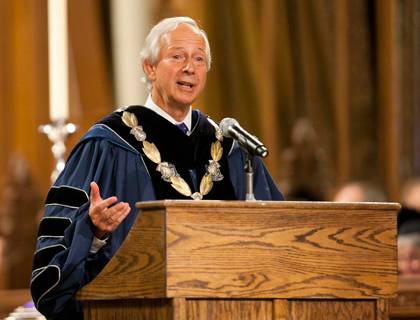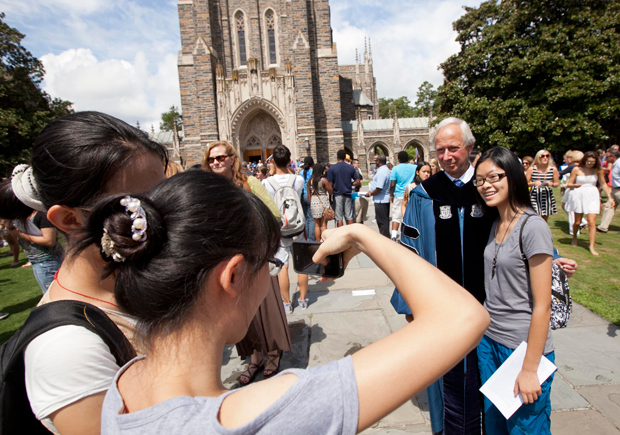Brodhead to Students: 'Let Your Passions Find You'
President Brodhead tells new students education will prepare them for the rest of their lives

I love the fact that Christoph Guttentag starts this assembly. The treasure hunters in our admissions office found you, so he deserves the chance to gloat. Plus he sets a good tone for the start of college. Official Duke could have been pompous, intimidating, overbearing -- instead, he was relaxed, unpretentious, friendly and fun. That's a good message to learn about Duke. This is a place where highly talented individuals live together in a state of mutual appreciation and enjoyment. You've come to a good place.
But fun and friendliness aren't the only moods this day should inspire. Did you see this sublimely beautiful building soaring around you? Did you feel Duke Chapel vibrate to that solemn organ tune? Do you see your president, regally dressed and obviously equipped with supernatural powers? Our welcome is genuine, but I hope you also feel some awe at what is about to begin. Today you make a fresh start on an altogether new life. This will be the first chapter of life that envisions you as an adult, no longer a child. And today you enter a life in which you'll have one and only one mission: to become the person you have it in you to be, a person equipped to lead a fulfilling life and to give the world the benefit of your gifts.
Now how are you going to perform this exalted task? Let me share an insight from one of Duke's great teachers. Last fall, Duke was delighted to learn that our longtime faculty member Robert Lefkowitz had won the Nobel Prize in Chemistry. He was honored for discovering the so-called G protein-coupled receptor, the mechanism on cells that detects a chemical change in their environment and produces a corresponding change inside the cell. You see a bear, your body secretes adrenaline, its molecule fits like a key into the receptor, unlocks it, enters the cells and sets your heart racing. The discovery of the action of receptors now forms the basis for hundreds of drugs, including beta blockers and antihistamines.
I got to interview Dr. Lefkowitz last year -- he is another funny, unpretentious person -- and I asked him, what can a teacher really do for a student? He said, I try to get them to reach the point where they feel absolutely absorbed in the inquiry they're involved in. Once they've felt a taste of that, they'll never be willing to give it up. He added: "President Kennedy used to cite the ancient Greek definition of happiness: 'the full use of your powers along lines of excellence.'"
You know, I hope, what he was talking about. Does this sound familiar? You're doing something that began as homework, a task set by someone else performed to please someone else, when suddenly you find you're engaged with the question, propelled forward by your curiosity, moving to pull together things you already know to help understand the thing you don't yet know. This does not happen only in academic work. Great coaches help players find how to release their full powers in excellent performance: that's why athletics can have a role in a university. Or you're in a musical or dance group, or debate team, or tutoring program in local schools -- you begin doing what you think is expected, but then some internal power switches on, and now it's you playing or teaching or performing, you're living inside the activity, reaching levels you did not know you could attain. Or you're talking with a friend, paddling in the shallow waters of casual conversation, when suddenly you've both moved deeper in, sharing something that matters, helping each other inhabit unfamiliar points of view, seeing together what neither of you could have seen on your own.
President Kennedy was paraphrasing Aristotle, and they both had it right: "Happiness is the full use of your powers along lines of excellence." There's pleasure to be found in knocking off or lying about, but the height of pleasure comes through engagement, through the activation of the self's full powers. We want you to be happy at Duke, so we need you to be engaged. But even more, engagement is the precondition for learning and growth. The things we do in an un-invested, half-hearted way leave no mark on us, even when we're extremely good at them. We do them, we forget them, it is as if they had never been. The things that inspire your deep participation are the things that expand you and transform you, releasing the recognition of what you can be at best.

Under the influence of Dr. Lefkowitz, I am visualizing Duke as an organism pumping thousands of stimuli out at you, things that can wake you up, shock you into responsiveness, and call forth your full powers of aspiration, curiosity, creativity and concern. These stimuli are partly academic but not exclusively so: everything you do here, every course, every activity, every conversation at a place so rich in intelligence and spirit, can be a chance for self-expansion and self-discovery. But just being at Duke won't guarantee you this enlargement. If you insulate yourself, if you hold back or shut yourself in from Duke's provocations, your Duke will be a land of missed opportunities. To receive what Duke can give you, you need to be a receptor, actively opening yourself to the opportunities around you.
So if you ever face a choice between hanging back and leaning in, remember what your president told you: receive, connect, engage. And if I could give one other tip, it would be to engage broadly, reaching far beyond what you've done before, even at the cost of taking risks. Duke students have always done so well in high school that when they arrive here, there's a danger that they will feel constrained to do only things they are already good at, to keep up the picture of the Perfect You. Taken to extremes, this can even lead to premature certainty about what you're going to be for the whole rest of your life -- a restriction parents can be guilty of abetting. But smart people seldom stick to scripts composed in their teens. More often, they only begin to find what they might do or be while they're in college, or even later. As a dutiful son, Dr. Lefkowitz set off to be a doctor; only later did he find that his true calling was to research. My new-found friend Stephen Colbert was a philosophy major when he started college. Only in college did he discover the love of theater that released him to his later career.
People are always telling students to "follow your passion," but you're a little young to know what passion should direct your whole life. I loved it when I heard a variant on this advice: not "Follow your passion" but "Give your passion a chance to find you." That's what college is for. Your horizon is about to be thrown open wide, to possibilities intellectual, social, global, and local that you have scarcely imagined. So why stay trapped in the little world you used to inhabit? Step out, step up: let Duke help you find who you might be.
Friends, we've been living through a sour-toned debate on the value of education, with many claiming that costs are out of control, learning could be delivered as well and far cheaper online, and the measure of education is to whether you get a well-paid job the day you graduate. I don't minimize the cost issue, and your parents will be quite right to expect you to support yourselves. But though the media has pretty much restricted itself to reporting the college-bashing line, there is another view: that the value of education is different from the cost; that a valuable education equips you for your whole life, not just your first job; that while this can be assisted by technology, it fundamentally works through human interaction, teachers and students, students and students unlocking each other's potential through living, face-to-face exchange.
When you chose Duke, you and your family put your bet on this second value proposition. You made a great choice, and that's what awaits you: a chance to build your whole person through personal interactions in a lively learning community. But to realize this value, you have to do more than pay the price. To get the value of Duke, you have to give yourself to it, throw yourself into every chance to learn and grow. Are you prepared to do that? Awesome! By the powers vested in me, I now declare you students of Duke.
Watch the convocation ceremony below.